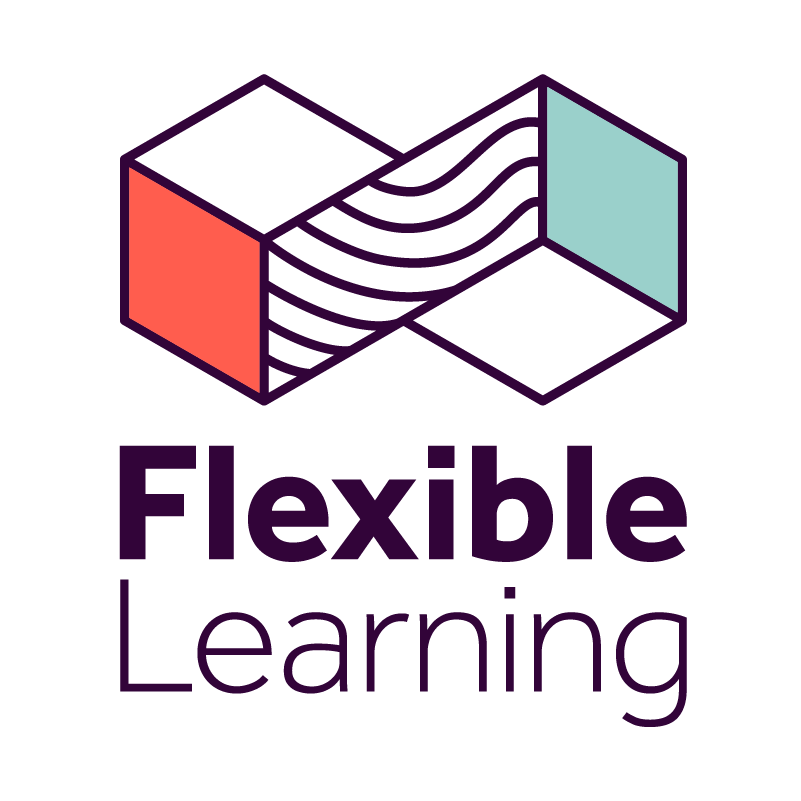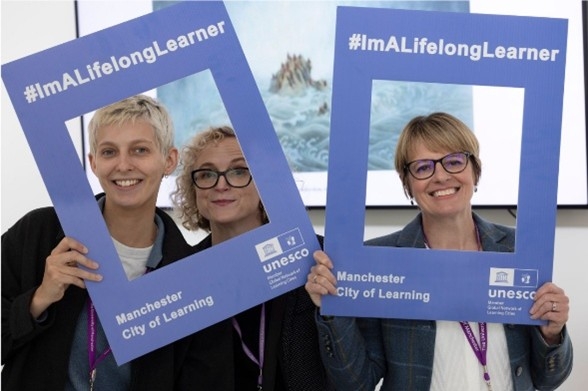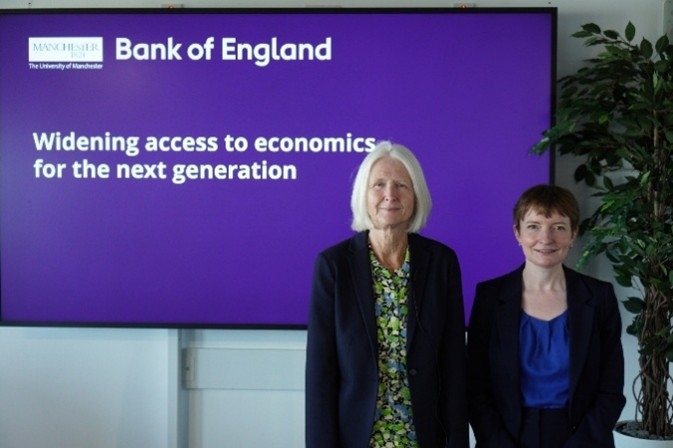Lifelong Learning

This workstream, led by Professor Ang Davies, how we can put in the right processes and infrastructure to embed a breadth of flexible education pathways making a Manchester education accessible throughout a learner’s lifetime.
There is a clear and growing need for new educational pathways to support learners’ aspirations at every stage of their lives.
Our goals were:
- To expand our capability to deliver courses flexibly, for example through microcredentials, so that we could respond to market demand and industry needs in a more agile way.
- To explore how we could enable staff to repurpose their existing course content as part of new learning pathways, such as microcredentials, so that the University could gain added value from our content.
- To innovate how we deliver courses by:
- Coordinating and supporting pilot short courses, focusing on co-design with industry,
- Developing strategic partnerships, including industry and other education providers.
What we’ve delivered:
Developing courses
In collaboration with the Education Development Team, we successfully launched a portfolio of pilot courses designed to test different operational models and meet immediate market demands. Key initiatives include:
- Early Experience: The OfS Short Course Pilot: The University's participation in the national Office for Students (OfS) Higher Education Short Course pilot tested the delivery of a flexible, modular course in Data Engineering by colleagues in Department of Computer Science
- Faculty Pathfinder Programmes: We initiated three distinct pathfinder programmes. These pilots were designed to test newapproaches to the development of professional learning focussing on co-design with strategic industry partners:
- Faculty of Biology, Medicine and Health with AstraZeneca: A programme focused on 'AI-enabled organisational change', designed to help a complex, science-led organisation navigates the challenges and opportunities presented by artificial intelligence.
- Faculty of Humanities with Fujitsu: A course on 'Digital Sustainability in Complex Organisations', addressing the growing need for businesses to integrate environmental sustainability into their digital strategy and operations.
- Faculty of Science and Engineering with Tesco: A targeted programme on 'Making Net Zero Happen' within fashion and home supply chains, equipping professionals with the knowledge to make sustainable decisions in their roles.
- Microcredential Portfolio: We developed a suite of four microcredentials in "Digital Trust and Security," working with the Dept of Criminology. This project tested if material could be repurposed from undergraduate interdisciplinary course units (UCIL) and repackaged into a set of microcredentials.
- Bootcamp Partnership with HyperionDev: We established a strategic partnership with HyperionDev to deliver a range of non-credit online bootcamps in high-demand digital skills like Software Engineering and Data Science. With HyperionDev managing delivery and the University providing brand and quality assurance and scrutiny of the learner experience, the partnership has generated £79,083 in income from 148 learners with minimal resource input required from the University.
Costing Model for Professional Learning
Addressing the operational barriers was our most critical task. Successful models at other universities with dedicated teams and agile processes and learning what worked well elsewhere helped us create a supportive infrastructure by:
- Improving Recognition and Incentives: We raised the value of non-standard teaching by developing a new costing model and adapting the University’s consultancy framework and influencing appropriate recognition within Faculty contribution models (FBMH) to support engagement.
- Streamlining Processes: We refined key processes, particularly around the approval of new business-to-business professional learning programmes, to ensure visibility with Heads of Schools and senior level sign-off and reduce administrative burdens.
Our achievements
Social responsibility and civic partnerships
Building a collaborative ecosystem has been central to our success and has amplified our impact. Our key collaborations have included:
- UNESCO City of Lifelong Learning:
We played an instrumental role in Manchester’s successful bid to become a UNESCO City of Learning, working in close partnership with Manchester City Council and solidifying the University’s status as a key civic leader in accessible education and lifelong learning.


In May 2025, in collaboration with Manchester Metropolitan University and Manchester City Council, we celebrated Manchester’s dual status as UNESCO’s City of Learning and City of Literature. Manchester is the only city in the UK to have this dual status.
- Greater Manchester Digital Skills Framework:
Our focus within the Learning City partnership was to co-develop this framework to address the city-region's digital skills gap. Our work has involved creating a proof-of-concept tool that enables us to link the skills needs of industry with the SFIA9 Digital skills competency framework and map this across to relevant educational curricula, using a Large Language Model to support our approach.

- Bank of England Teacher Training Partnership:
We collaborated with academics within Manchester Institute of Education, the Bank of England and the Education Development Team to launch a new professional development programme ‘Teach Economics’.
The initiative addresses a stark regional and national shortage of qualified economics teachers by offering training for existing teachers to deliver A-Level economics.
Piloted in the Northwest at no cost to schools, the programme aims to make the economics more accessible to students from a wider range of backgrounds, directly tackling educational inequality.

Public and community engagement
We have successfully engaged the wider community through accessible learning initiatives that showcase the University's expertise and commitment to social responsibility.
- Wild Talk Public Lecture Series: Our partnership with Manchester Museum delivered a series of five public talks on climate, biodiversity, and rewilding, attracting over 500 attendees and promoting our lifelong learning offer.
Outcomes
- More flexible lifelong learning courses
- Removal of policy and process barriers to flexible learning
- Improved quality and consistency of professional learning
- Wider variety of learners studying at the
- Increased cross-institutional collaboration, especially with Business Engagement and Knowledge Exchange (BEKE) Team
- Provided a pathway for industry engagement regarding professional learning for the University
Team
- Prof Ang Davies – Academic Lead for Lifelong Learning
- Alex Abel – Project Manager
- Trev Humphries – Business Engagement Manager
- Lara Curtin – Communications Lead
- Owen Dobson – Project Coordinator
Collaborators: Education Development, Business Engagement & Knowledge Exchange, Office for Social Responsibility and Executive Education
